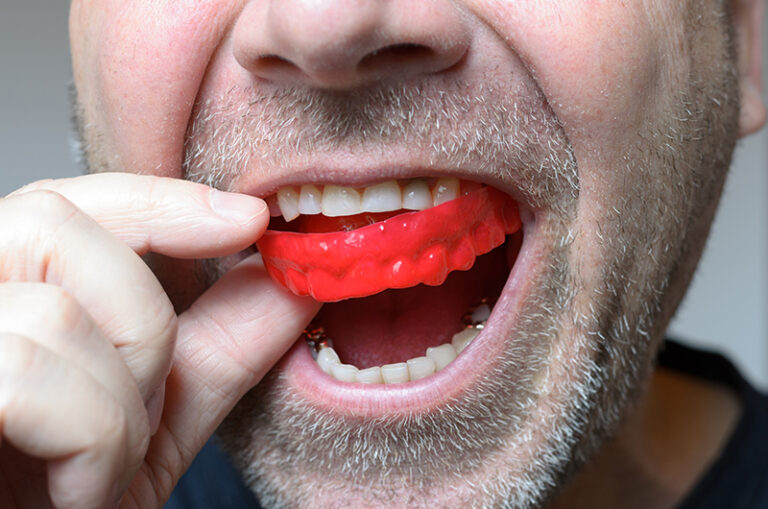Mouthguards Near You
Bruxism arises when you grind your teeth or clench your jaw, and it can happen during the day or unconsciously while you are sleeping. If it’s left unaddressed, it can cause fragmentation, sensitivity, worn-down teeth, and even headaches. The motions that characterize this condition exerts much stress on the muscles and joints in the jaw and face.
Stress, Alzheimer’s disease, or certain medications can lead to Bruxism. It’s easy for this issue to be missed or misdiagnosed because tooth wear can happen for a variety of reasons. Only a trained dentist will be able to tell if tooth wear is from grinding your teeth or due to other factors such as brushing too hard or drinking acidic soft drinks. If you’re concerned about anything, don’t be afraid to book a consultation with your dentist.

Why Address Bruxism?
- Gum recession and tooth loss: Bruxism can cause gums to pull back and teeth to fall out. It damages the gums and can make teeth loose, allowing bacteria to get into deep pockets and harm the bone that holds the teeth.
- Tooth damage: The grinding can wear down your teeth unevenly, causing cracks that may need repair.
- Arthritis: In serious cases, grinding can cause arthritis in the jaw joints, making it painful to open and close your mouth.
- Muscle soreness: The constant grinding can wear down your teeth, leading to muscle pain and soreness in your face and neck, along with bad headaches.
How to Treat Bruxism
There isn’t a one-size-fits-all solution for bruxism, but there are several effective ways to manage it. Here are some treatments your Airdrie dentist might suggest:
- Mouth guards: A custom acrylic mouthguard is made using impressions of your teeth. It helps reduce the damage from grinding while you sleep by protecting your teeth and stabilizing the jaw joint.
- NTI-tss device: This device is fitted by a professional and only covers your front teeth. It helps stop grinding by limiting the muscle movements that cause the back teeth to grind.
- Botox®: Botox® can be injected into jaw muscles to relax them. It’s effective for bruxism because it reduces muscle strength enough to stop grinding, without affecting your ability to chew or speak.
Other treatments may include relaxation techniques, stress management, and biofeedback to help control bruxism. Once grinding is under control, dental treatments like crowns, gum grafts, and crown lengthening can be done to improve your smile’s appearance.
Have Questions? Contact Us
Contact our team at King’s Pointe Dental Centre if you’re ready to receive the dental care you need and deserve. Whether you’re looking to remedy bruxism or simply need to schedule a routine dental exam, we can help. Call or email our practice today to pick a day and time to visit – we are excited to meet and help you reach your smile goals.
FAQ'S
Why do I need a mouthguard?
A mouthguard prevents your teeth from getting damaged when engaging in sports or grinding at night. It can prevent chips and cracks from developing and other forms of oral trauma. Wearing it also prevents your jaw from receiving hard hits. Your dentist can make sure it fits you well for the best protection.
How do I choose the right mouthguard?
Your dentist can assist you in selecting the type that will be best for your needs. Custom-fitted guards are wonderful because they fit perfectly on your teeth. There are quite a number you can buy over the counter, but they won’t fit as neatly. You need to select one that is comfortable and does not fall out.
Can I wear a mouthguard for both sports and bruxism?
It is best to have a different guard for each use. Sports guards are designed to prevent sharp, sudden blows, and night guards guard against grinding. Your dentist will let you know which one you will use for which. Having the proper one will maintain your teeth in good health and protection.
How do I clean and care for my mouthguard?
It should be washed with cold water after use to keep it in good condition. Brush away any deposits with a toothbrush and gentle soap. Let it dry naturally and then put it in its case. Occasionally cleaning it will make it last longer as well as remain clean.
Is a mouthguard uncomfortable to wear?
Everyone accommodates themselves to wearing a guard within a few days. A custom-made one is smooth and feels good between your teeth. It can be adjusted by your dentist if it’s not comfortable or too tight. You’ll find yourself hardly even aware that you have it on soon enough.
Can a mouthguard prevent concussions?
A mouth guard can diminish the risk of some jaw injuries and minimize the shock to your head. Though it can’t always prevent a concussion, it is an extra layer of protection, which is well worth having. It’s always better than having none. It’s an excellent option for both sporting events and night grinding.
